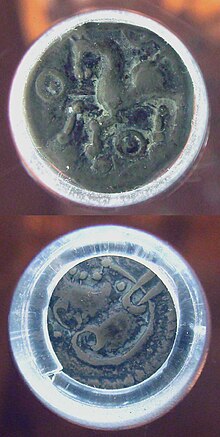Aedui

The Aedui, Haedui, or Hedui (Template:Lang-grc) were a Gallic people of Gallia Lugdunensis, who inhabited the country between the Arar (Saône) and Liger (Loire), in today's France. Their territory thus included the greater part of the modern departments of Saône-et-Loire, Côte-d'Or and Nièvre.[1]
Geography
The country of the Aedui is defined by reports of them in ancient writings. The upper Loire formed their western border,[2] separating them from the Bituriges. The Saône formed their eastern border, separating them from the Sequani.[3] The Sequani did not reside in the region of the confluence of the Doubs into the Saône and of the latter into the Rhône, as Caesar says that the Helvetii, following the pass between the Jura Mountains and the Rhône southwards, which belonged to the Sequani, plundered the territory of the Aedui.[4] These circumstances explain an apparent contradiction in Strabo, who in one sentence says that the Aedui lived between the Saône and the Doubs, and in the next, that the Sequani lived across the Saône (eastward).[5] Both statements are true, the first in the south, and the second to the north.
History

According to Livy (v. 34), they took part in the expedition of Bellovesus into Italy in the 6th century BC.
Before Julius Caesar'stime, they had attached themselves to the Romans and were honoured with the title of brothers and kinsmen of the Roman people.[6]
When the Sequani, their hereditary rivals, with the assistance of a Germanic chieftain named Ariovistus, defeated and massacred the Aedui at the Battle of Magetobriga, the Aedui sent Diviciacus, the druid, to Rome to appeal to the senate for help, but his mission was unsuccessful.[1]
On his arrival in Gaul (58 BC), Caesar restored their independence. In spite of this, the Aedui joined the Gallic coalition against Caesar (B. G. vii. 42), but after the surrender of Vercingetorix at the Battle of Alesia, were glad to return to their allegiance. Augustus dismantled[citation needed] their native capital Bibracte on Mont Beuvray and substituted a new town with a half-Roman, half-Gaulish name, Augustodunum (modern Autun).
In 21, during the reign of Tiberius, they revolted under Julius Sacrovir, and seized Augustodunum, but they were soon put down by Gaius Silius (Tacitus Ann. iii. 43-46). The Aedui were the first of the Gauls to receive from the emperor Claudius the distinction of jus honorum, thus being the first Gauls permitted to become senators.[7]
The oration of Eumenius, in which he pleaded for the restoration of the schools of his native place Augustodunum, shows that the district was neglected. The chief magistrate of the Aedui in Caesar's time was called Vergobretus (according to Mommsen, "judgment-worker"), who was elected annually, possessed powers of life and death but was forbidden to go beyond the frontier. Certain clientes, or small communities, were also dependent upon the Aedui.[1]
It is possible that the Aedui adopted many of the governmental practices of the Romans, such as electing magistrates and other officials or perhaps it was a natural development in their political system. It is thought that other Celtic tribes, such as the Remi and the Baiocasses, also elected their leaders.[citation needed]
See also
Notes
- ^ a b c One or more of the preceding sentences incorporates text from a publication now in the public domain: Chisholm, Hugh, ed. (1911). "Aedui". Encyclopædia Britannica. Vol. 1 (11th ed.). Cambridge University Press. This cites:
- A. E. Desjardins, Géographie de la Gaule, ii. (1876–1893)
- T. R. Holmes, Caesar's Conquest of Gaul (1899).
- ^ Caesar & BG, Book vii, Section 5.
- ^ Caesar & BG, Book I, Section 12.
- ^ Caesar & BG, Book I, Section 11.
- ^ Strabo & Geography, Book 4, Chapter 3, Section 2.
- ^ Caesar & BG, Book I, Section 33.
- ^ Peoples, Nations and Cultures. General Editor Prof John Mackenzie. Weidenfeld and Nicolson. 2005.
Bibliography
- Caesar, Julius. De Bello Gallico.
- Strabo. Geography.
- A. E. Desjardins, Geographie de la Gaule, ii. (1876–1893)
- T. Rice Holmes, Caesar's Conquest of Gaul (1899).


